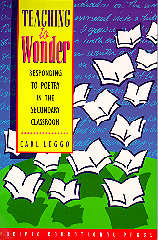


|
Teaching to Wonder: Responding to Poetry in the Secondary Classroom.
Carl Leggo.
Subject Heading:
Professional Resource.
***1/2 /4
|

Poetry - the word instills fear and loathing in many students [and many of their teachers, too.] "What" is a poem? "How" do you teach a poem? "Should" you teach a poem? Drawing on his experiences as writer of poetry and as a secondary school teacher, Carl Leggo offers a number of practical approaches to the first two questions. Teaching to Wonder contains reading and writing activities grounded in the realities of classroom practice. Equally important, Leggo also provides an overview of four current theoretical perspectives on how readers read poems: reader response, semiotics, deconstruction, and cultural criticism. Despite the currency of these approaches, New Criticism still has its practitioners in the classrooms of the 90's, and to its adherents, Leggo offers worthwhile reasons to examine other teaching strategies.
Perhaps the most significant disadvantage of the New Criticism is that by concentrating on how the machinery of the text (ambiguity, symbolism, parado) produces the unitary meaning, the New Critics devalued the role of readers, who became functions of the text manipulated by the text to respond in certain ways. Readers were either competent or incompetent, depending on how successfully they were able to decode the poem and its hidden meaning.
In less than 150 pages, Leggo's theoretical overviews, descriptions of classroom activities, and examples of various poems are necessarily limited. Nevertheless, he provides valid reasons as to why secondary school teachers should re-examine long-held ideas as to what constitutes a poem and offers very useful starting points as to how they might undertake new approaches. His voice is informal, supportive, and draws on his own experiences as a reader, writer, and teacher of poetry. "Should" you teach a poem? Absolutely, and with Teaching to Wonder in hand, both new and experienced teachers would probably be certain that it's the right thing to do.
Recommended.
Joanne Peters is an English teacher and teacher-librarian at Kelvin High School in Winnipeg, Manitoba.

To comment on this title or this review, send mail to cm@umanitoba.ca.
Copyright © 1998 the Manitoba Library Association. Reproduction for personal use is permitted only if this copyright notice is maintained. Any other reproduction is prohibited without permission.
Published by
The Manitoba Library Association
ISSN 1201-9364
TABLE OF CONTENTS FOR THIS ISSUE - FEBRUARY 13, 1998.
AUTHORS | TITLES | MEDIA REVIEWS | BOOKSHELF | BACK ISSUES | SEARCH | CMARCHIVE | HOME